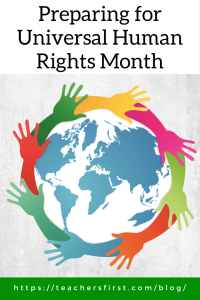As December approaches, educators worldwide will work to share an understanding of the values of justice, equality, and human dignity with their students. Universal Human Rights Month, observed each December, is a powerful reminder of the fundamental rights and freedoms to which every individual should be entitled. It’s an excellent occasion for teachers to introduce these essential concepts to their students and promote a culture of global human rights awareness and advocacy. Whether you’re an elementary school teacher looking to introduce these vital concepts to young minds or a high school educator aiming to delve deeper into human rights discussions, these resources provide free and engaging activities to inspire your students during this significant month of reflection and learning.
For everyone:
- What are the Universal Human Rights? by Ted-Ed (reviewed here) provides an excellent introduction to the topic of human rights that is adaptable for students of all ages. Modify the included discussion questions to match your students’ level of understanding as needed.
Elementary:
- Kid Power encourages students to learn about human rights by watching videos while earning points to buy food packets and coins to support local causes in their community. Choose from activity options for all grade levels from K–12 or from topics such as mindfulness, energy busters, and breathe and reset.
- For every ten videos your students watch, one food packet (known as a ready-to-use therapeutic food packet or RUTF) is unlocked for a needy child. Each packet contains nutrients to reverse the effects of malnutrition.
- Each video completed earns students Kid Power Coins. Your class can decide as a group what local cause in your community they want to support.
- Assign videos to watch at home if desired, or play during school periods to energize and boost activity through engaging games.
- Kid Power partners with Epic! (reviewed here) to provide more diverse, high-quality videos.
- Extend Learning:
- Non-tech option: Create posters with information about human rights to display in your classroom and share with others in your school.
- Technology option: Use Canva for Education (reviewed here) to create digital posters to include on your class and school website. Conduct a school-wide poster contest and let the winner(s) choose a local cause for the school community to donate to.
Middle School:
- The Free Youth for Human Rights Course teaches students about the 30 basic human rights and gives background information about the Universal Declaration of Human Rights.
- Each of the six lessons begins with vocabulary, then uses videos to teach about the basic rights, and ends each lesson with a quiz.
- Preview videos from the lessons on the Youth for Human Rights YouTube Channel.
- Extend Learning:
- Non-tech option: Conduct a letter-writing project to government officials and representatives expressing concern about human rights issues.
- Technology option: Ask students to use a free web page maker tool such as Site123 (reviewed here) to create a website that shares their concerns about human rights with government officials. Include a petition for website visitors to sign in support of students’ concerns. This page shares examples of how to include a petition on Site123.
High School:
- Khan Academy’s (reviewed here) human rights lesson, part of World History Project’s 1750–present unit, introduces the Universal Declaration of Human Rights through lessons that include articles and videos.
- View this example video about nonviolence and peace movements.
- To supplement the Khan Academy lesson, share Human Rights Watch with your students by adding a link on your class website. Use this site to find up-to-date news on global human rights issues. Use the search features to find issues by country or topic. Other filters provide options that look at the impacts of events on human rights and share ways to take action.
- Extend Learning:
- Non-tech option: Continue to research and discuss human rights issues in various locations by integrating these discussions in curriculum areas studied throughout the year. Doing so provides context and understanding of the prevalence of these issues globally.
- Technology option: Challenge groups of students to create documentaries that focus on a human rights issue of their choice. Offer choice in the video tool used to produce their documentary. For example, some students may prefer to use Adobe Premier Rush (reviewed here) to edit and produce a video, while others may choose Powtoon (reviewed here) to create an animated explainer of human rights issues.
The importance of the Universal Declaration of Human Rights extends far beyond the classroom; it reminds us of our collective responsibility to protect and promote the rights of every individual everywhere. As we approach December and Universal Human Rights Month, let’s take the opportunity to share an understanding of the principles of basic human rights for all and illustrate each person’s individual role as part of the larger society. Promoting human rights values like dignity, respect, and equality should not be limited to December—these principles can, and should, shape our teaching all year long.
What ideas do you have for introducing Universal Human Rights Month in your classroom? We’d love to see your suggestions in the comments below.


